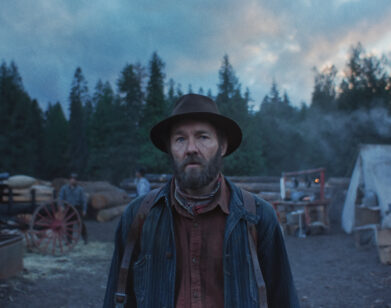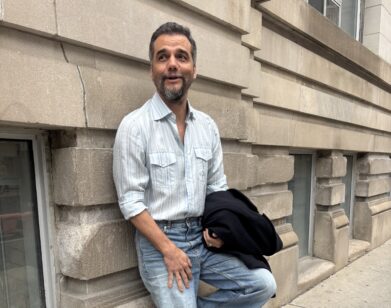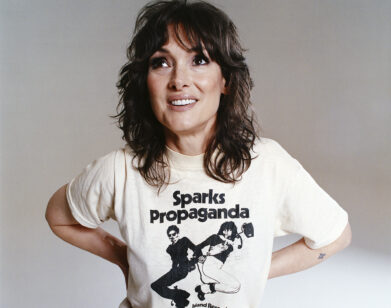MOVIEMAKING
Mike Mills Still Has Faith for the Future

Mike Mills, Joaquin Phoenix (L-R)
Mike Mills is—in his own words—a big softie. His incredible capacity for emotional generosity is something the writer and director wears on his sleeve, and employs to terrific effect in films like Beginners and 20th Century Women. Both were inspired by his father’s coming out late in life, and his experiences growing up in a matriarchal family in the 1970s. Mills consistently imbues his work with real-life experience, an approach he took on his latest movie, C’mon C’mon. Inspired by his child Hopper, the movie stars Joaquin Phoenix as a radio journalist named Johnny who is traveling around the country interviewing young children about their thoughts on the future. When he is asked by his sister Viv (Gaby Hoffmann) to watch his nephew Jesse (Woody Norman, in a breakout performance), the two men must learn to connect. On the occasion of the film’s release, Mills spoke to Interview about his creative process, non-normative upbringings, and whether or not the kids are alright.
———
CONOR WILLIAMS: Hi Mike, congratulations on the film. It’s another beautiful entry in your already thoughtful body of work. Before we get into that film, I’d love to talk to you about your last two features, 20th Century Women and Beginners. Beginners was remarkably influential to me on a personal level for two reasons. First of all, it was my first time seeing an essay film. Your films, to me, are like essay films in disguise. Secondly, it propelled me, in my early teenage years, to come out.
MIKE MILLS: Oh, wow. That’s quite amazing to hear. That’s wild. My dad would be so happy. He’d want to give you a big hug, from the fifties to now. A long, historical hug.
WILLIAMS: What is your process like regarding archival material? Is it something you imagine while you’re writing the screenplay?
MILLS: Yeah. Things always change, and I like things to change or grow. I don’t want to be done. I want to keep engaging and learning and making it better. But what you’re talking about is in the script. I do really like a film language that’s heterogeneous. Vivre sa Vie comes to mind, that documentary section right in the middle of it. Or Hiroshima, Mon Amour. Godard does it all the time, bringing in texts and cultural documents. I went to art school, not film school. I went to Cooper Union and studied with Hans Haacke, a very conceptual-art version of art school. So working in any kind of medium, the ideas of authorship were very expansive. Authorship is also curating, or selecting, or bringing with. So all those kinds of things are a big part of what gets me excited, my toolbox.
WILLIAMS: Beginners, 20th Century Women, and C’mon C’mon are all films that explore a sort of queered, alternative approach to traditional masculinity. In the first, Christopher Plummer’s character is redecorating the final years of his life through his newly reclaimed sexuality. In 20th Century Women, a young boy is taught how to be a man through the guidance of the women in his life. And in your newest film, Joaquin Phoenix learns how to look after his nephew by adopting his more whimsical ideas on life. Where did this fascination with alternative masculinity come from? Was it something you were taught as a child?
MILLS: Did you describe it as “queered?” I like that description a lot. I would never dare to say it myself as a middle-aged straight guy. I grew up in a very unique family. It’s a matriarchy, my mom’s the powerful one. I have two older sisters, and one of them is the Greta Gerwig character in 20th, so I’m kind of like that kid to Greta. My introduction to culture was through all the women in my life. It’s always been the way for me. My dad’s gender identity and expression is pretty binary male, but he doesn’t hold on to patriarchal power as the father in my house. He’s an art historian who doesn’t know where the fork drawer is and doesn’t do anything with money, and my mom is a very butch, short-haired, pants-wearing pilot in WWII. So her gender identity and expression is actually very non-conformist. All those signifiers are weird. Not weird, but non-normative. In my family now, all those themes run high. It’s a big part of my consciousness both with my kid and my partner. I love being described that way. I don’t find normative American masculinity comfortable at all. It’s a source of how I’ve gotten beat up so many times in my life. Obviously it’s an outfit that benefits me, but…
WILLIAMS: Not one you wear well?
MILLS: It doesn’t fit great.
WILLIAMS: Another thing that these films have in common is generational distance, especially 20th. One of the most moving moments in that film, which is set in ‘70s California, is when Dorothea says, “These kids don’t realize that this is the end of punk. They don’t know that Reagan is coming, that HIV is coming. It’ll be hard to understand that they’ll have nightmares about the weather.” In C’mon C’mon, we meet real kids who have had to contend with the effects of what the kids of the ‘70s couldn’t predict.
MILLS: Beginners and 20th are really about what you just said, because my parents were born in the ‘20s and had me at 40 in 1966, and no one that age was having a kid in 1966. I had no friends that were like that. So I was into punk rock, skating, all that stuff, in late ‘70s. And my parents were telling Depression stories and WWII stories. There was this real crazy disconnect. But having grown up in the ‘30s in America, I found them to be really subversive people. Anti-authoritarian vibes were so much more in that culture. Like pre-Hayes films. My mom loved Bogart. Bogart’s signifying narrative was as an outsider, subversive, the underdog. So all those funny historical slots and the way they do and don’t fit together has been a real embodied experience for me. It keeps coming out in the writing. But I don’t know if that’s true with C’mon, I have to say. Maybe it is, because I had my kid late, when I was 46. And this movie is a lot about me and my kid. And there is this amazing generation gap between me and my kid. So maybe it is.
WILLIAMS: In C’mon, C’mon, Joaquin plays an NPR-type journalist alongside Molly Webster, who is a real producer for RadioLab. What led you to incorporate this journalistic thread into the film?
MILLS: A lot of times with writing, you start off with some kind of hunch, and either the hunch pays off and stays in the script, or your hunch dies out. I just love radio stuff. I kinda wish I did it, I think. The grass is always greener. I like a real simple thing like that where you don’t need eight million dollars. You can just go do your thing. I like the minimalism of it, that it’s just sound. Ira Glass has been a big hero and a big help to me. I would like to be like that. I’d like to be Studs Turkel. I had done this piece before where I interviewed kids about the future, and it kind of haunted me. I wanted more of it. I figured that could be the psychic setting for my film, these kids’ answers. It’s like a place, but it’s young people’s consciousness about the world. So the idea of Joaquin being a radio journalist kept connecting to other things. So I was like, great, that’s how I can do the interviews and incorporate them into the story. Also, this deeper thing of just listening, as an activity, as an action, sound as ephemerality incarnate. You can’t have sound without time. Sound is always going by. That’s a theme of the movie, how you can’t hold on to anything, really.
WILLIAMS: Do you think housing autobiographical elements within fictional films provides you with narrative safety?
MILLS: It’s the opposite. It’s so fucking risky. I run the risk of being called indulgent and of tarnishing the memory of a loved one, or reducing it or fucking with it. I know what you’re talking about, more like, writing-process safety, but I can’t separate the two. “Autobiographical house” is well put. But to me it’s more like autobiography as either compost or the seed. To a plant, it’s actually not the same thing. It’s what makes you make the whole thing, it’s what feeds it. It couldn’t exist without the seed or the soil, but it’s not the same as the seed or the soil. It really isn’t. Woody is not my kid. At all. Woody’s performance as Jesse absolutely could not exist without my kid, but it’s such a weird layer… I trip myself out about what my movies are. I don’t quite understand it. I’ll sit around and talk to my friends, and they’re like, “It’s so your life.” And I’m like, “Is it?” And then sometimes I’m like, “Holy crap. I quoted something so directly, that’s insane! Why am I doing that?”
WILLIAMS: You quote [the documentary filmmaker] Kirsten Johnston in the film. Was she any sort of creative guide for you?
MILLS: I love Cameraperson and I adore her. But I wasn’t thinking about her during the film. In the middle of my edit, which was during the pandemic, which was very long and lonely, I did a Zoom Q&A with Kirsten for Dick Johnson is Dead.
WILLIAMS: Which was great.
MILLS: Right? Such an amazing film. It fucking cracked me open. So we’re doing it, she’s lovely, hyper brilliant, and I’m sitting right in front of my edit, and in my head, I’m remembering her Cameraperson essay. It would describe what’s going on in Johnny’s life, the complexities of doing documentary work, which I want to acknowledge as I’m interviewing all these non-actor kids. So I asked her if I could put her text in my movie, and she was like, “Well, if I get to hear Joaquin Phoenix saying my words, sure.” She was very funny and delightful about allowing that to happen. And that’s one of my favorite parts of the film. I love that it’s not my writing.
WILLIAMS: Your movies always make me cry. What is a movie that always makes you cry?
MILLS: It’s a Wonderful Life. And, for this movie, I really got a lot from Alice in the Cities.
WILLIAMS: The children in the film are asked if they have hope for the future. Do you have hope for the future?
MILLS: I’m scared. It’s a source of total anxiety as a parent and as a human.
WILLIAMS: Well, how about this? What gives you hope?
MILLS: Kids. The emotional intelligence of young people is so much more expansive. My kid is non-binary, my kid’s life has so much more options which I find promote real mental health and real community and real anti-authoritarian, anti-patriarchal handles. So all that feels really positive. Someone like Greta Thunberg, I’m like, right on. That she’s dealing with her own neurodiversity and employing it in this really beautiful, powerful way, that gives me hope. Talking to all those kids in the movie, even when they’re saying very dark things, they have such an intelligence. They’re unburdened by “shoulds.” It’s powerful and exciting and nice to be around.
WILLIAMS: I feel like everybody has said, “So, this movie is based on your kid.” And I feel like you’ve had to say the same things. So, what is something that Hopper has taught you?
MILLS: So many things. A lot of them I’d like to remain private, and that’s something I’m trying to manage, because I’m trying to manage a space where this film is not that important in my kid’s life. Maybe someday when they’re older, they’ll watch it. And maybe not. Hopper should know that I love them and that they’re awesome and that I’ll always care for them. This movie shouldn’t be the way they learn that. What’s something Hopper taught me? Okay. I was struggling with the script, and I was having a hard time–should it be funny or not? What is funny? And Hopper said, “Be funny, comma, when you can, period.” I thought that was quite brilliant. I loved that it leaned towards humor, and humor means space. It’s space to be all different ways. It breaks ground, and breaks forms. You usually laugh when a form breaks.
WILLIAMS: It’s also connected to time.
MILLS: That’s really interesting. So, I think Hopper has reminded me about positivity. Also, “when you can,” what lovely permission, right? To not be able. I love that. That’s so not my upbringing. I like that a lot.






